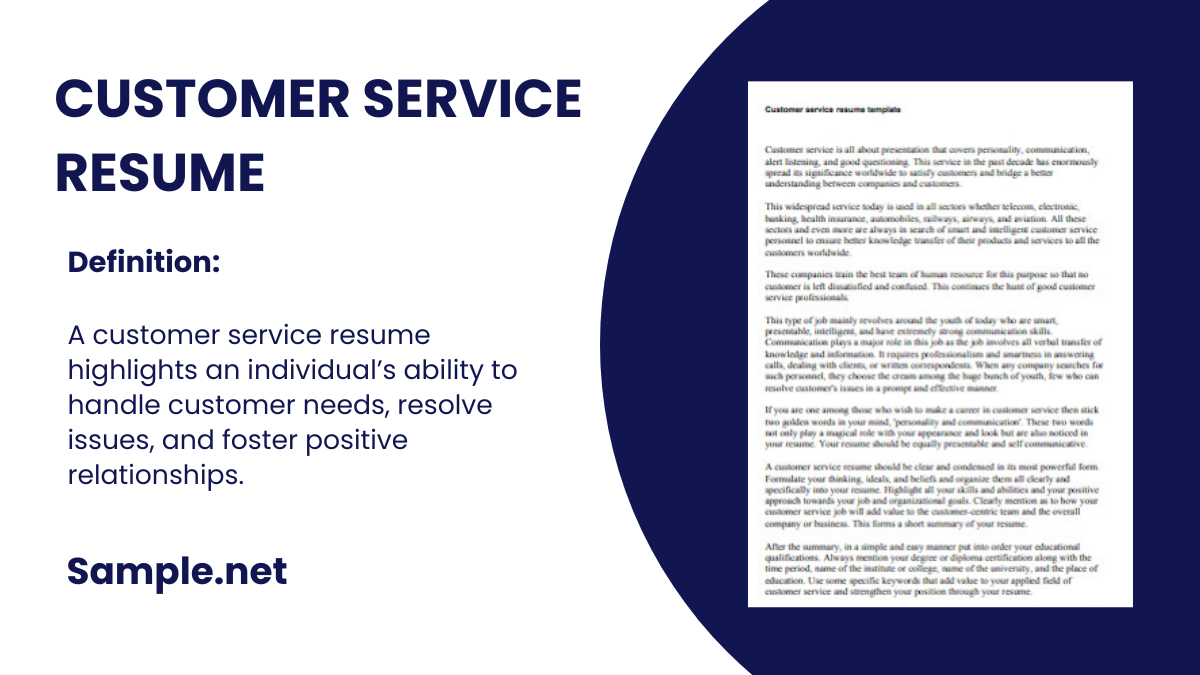A customer service resume highlights an individual’s ability to handle customer needs, resolve issues, and foster positive relationships. It should showcase key skills such as communication, problem-solving, and adaptability…
continue reading
21+ Sample Internship Resume
-
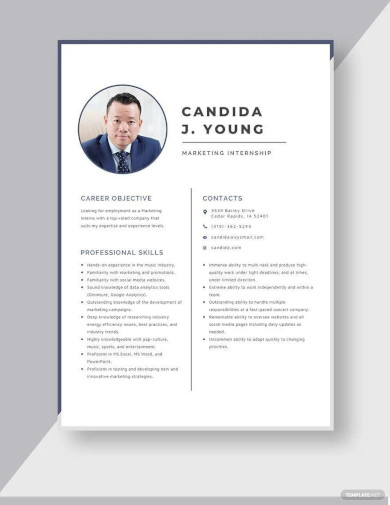
Marketing Internship Resume
download now -
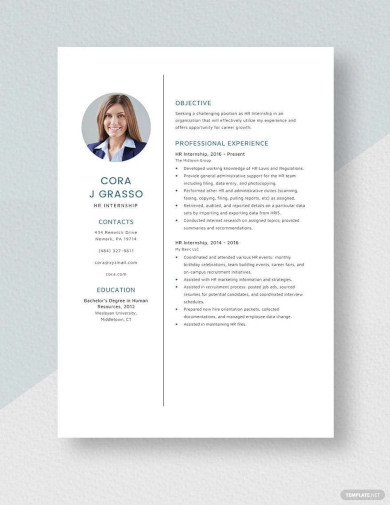
HR Internship Resume
download now -
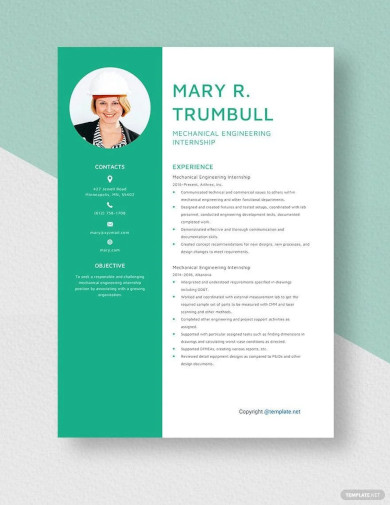
Mechanical Engineering Internship Resume
download now -
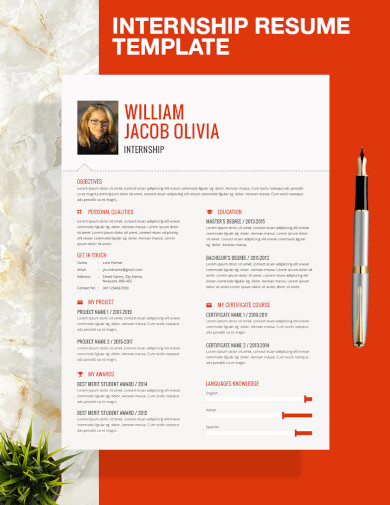
Modern Internship Resume
download now -
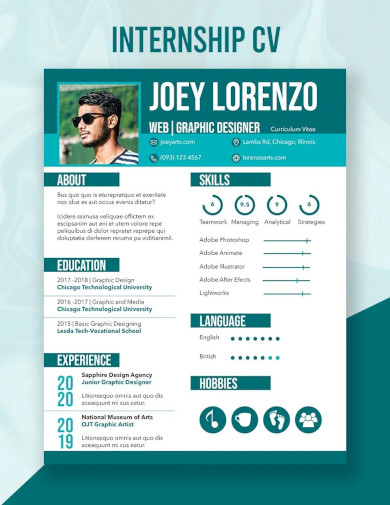
Simple Internship Resume
download now -
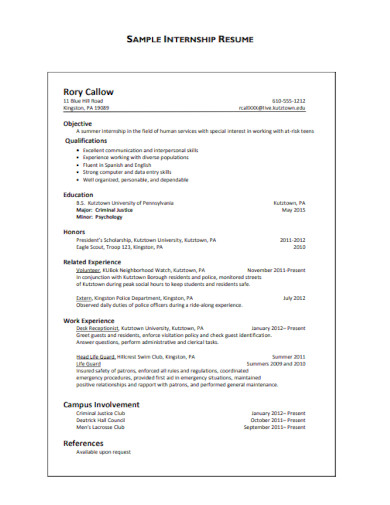
Sample Internship Resume
download now -
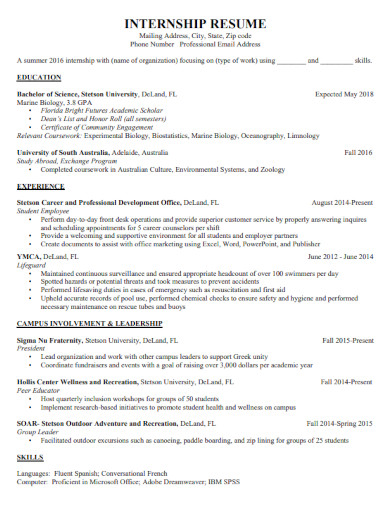
Education Internship Resume
download now -
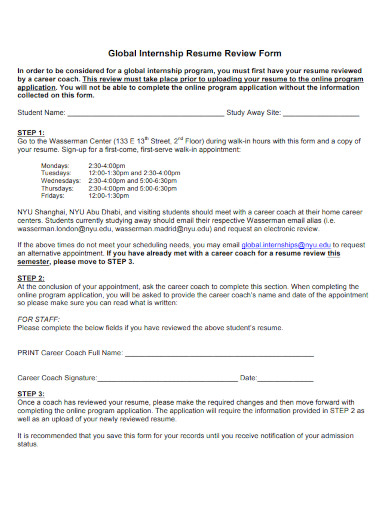
Global Internship Resume Review Form
download now -
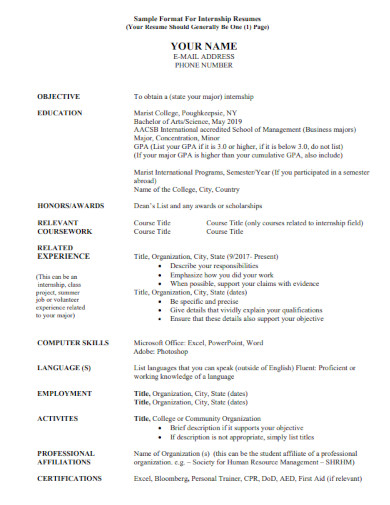
Format For Internship Resumes
download now -
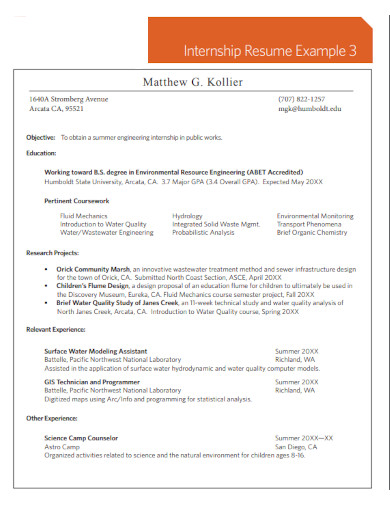
Internship Resume Example
download now -
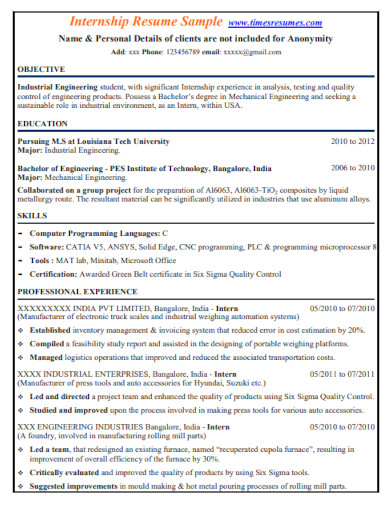
Editable Internship Resume
download now -
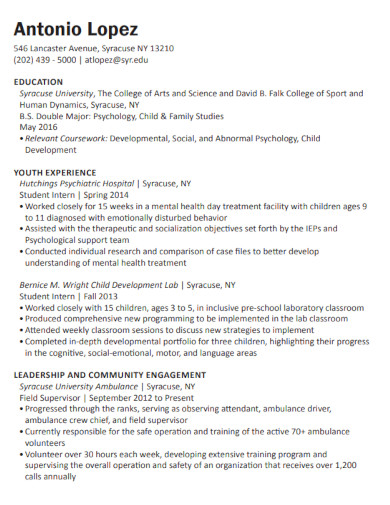
Student Internship Resume
download now -
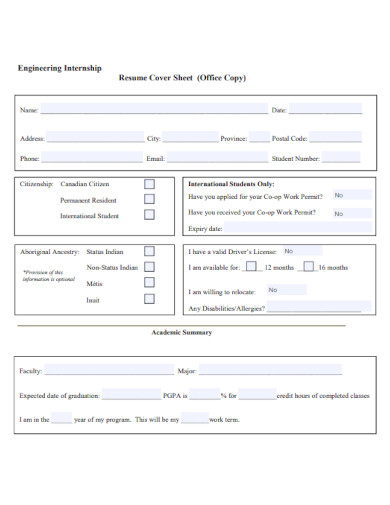
Engineering Internship Resume Cover Letter
download now -
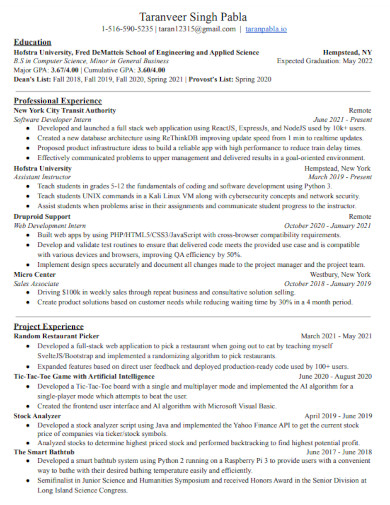
Software Developer Internship Resume
download now -
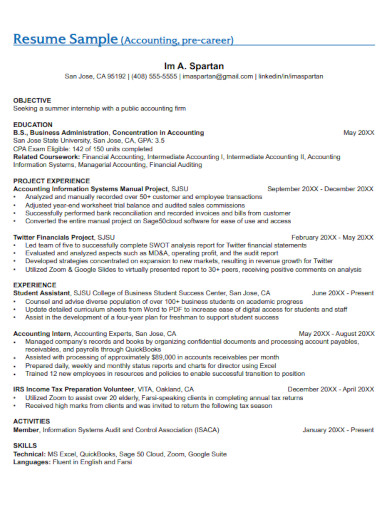
Summer Internship Resume
download now -
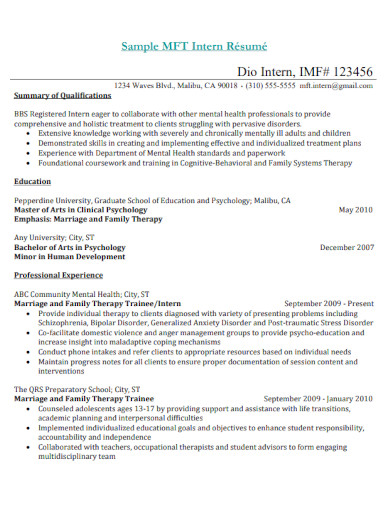
University Internship Resume
download now -
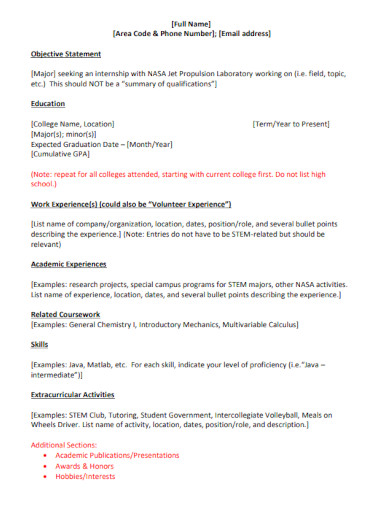
Standard Internship Resume
download now -
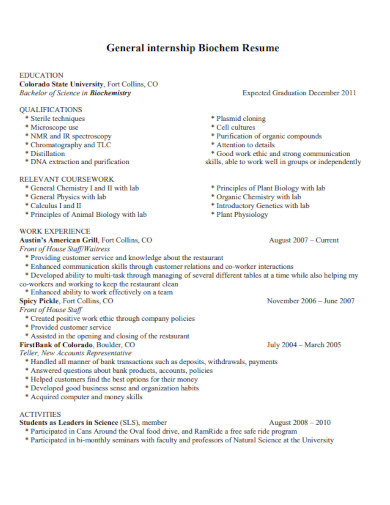
General Internship Biochem Resume
download now -
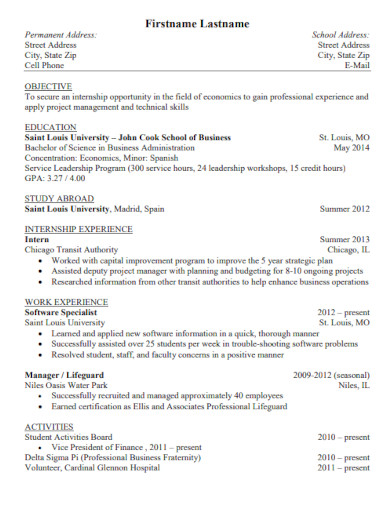
Experienced Internship Resume
download now -
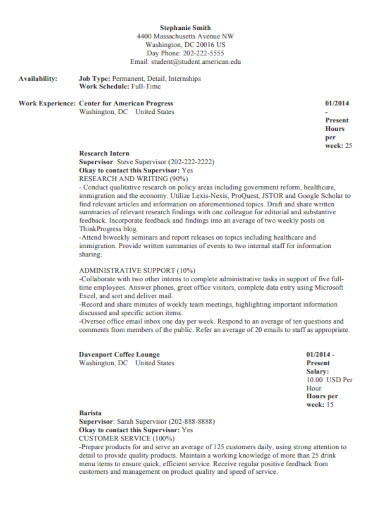
Research Internship Resume
download now -
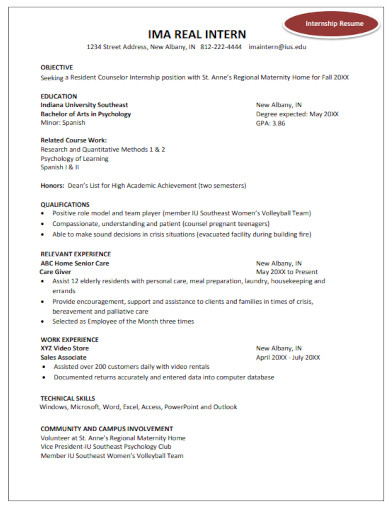
Printable Internship Resume
download now -
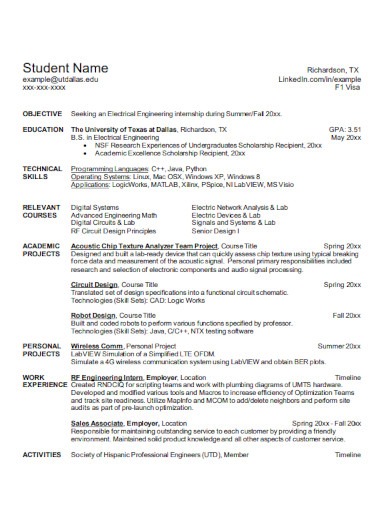
General Internship Resume
download now
How to Write an Internship Resume
Writing an internship resume is different from crafting one for a full-time job. As an intern, you might not have much relevant work experience, but that doesn’t mean your resume sample should be lacking. Instead, it’s essential to highlight the skills, education, and experiences that make you an ideal candidate for the internship role. Here’s a step-by-step guide on how to create an effective internship resume:
1. Choose a Professional Format:
Stick with a traditional format: a clean, one-page layout with clear headings, bullets, and a professional font. The order of sections may vary based on what you want to emphasize.
2. Begin with Contact Information:
At the top, list your:
Full name
Address (can be limited to city and state)
Phone number
Professional email address
LinkedIn profile or professional website, if applicable
3. Objective or Summary Statement:
Though optional, a well-crafted objective can set the tone for the rest of your resume. Tailor it to the specific internship, mentioning the role and how your background makes you a great fit.
4. Education:
As a student or recent graduate, your educational background will be one of your primary selling points. Include:
University/college name and location
Degree and major
Expected graduation date
Relevant coursework
GPA (if it’s strong and will bolster your application)
5. Experience:
This section can encompass both paid and unpaid experiences:
List any relevant work, volunteer positions, or substantial projects.
Start with the most recent experience and work backward.
For each, list the title, company or organization name, location, and dates of employment.
Use bullet points to detail responsibilities, accomplishments, or skills acquired.
6. Skills:
Highlight specific skills that are relevant to the internship. This could include:
Technical skills (software, tools, or platforms you’re familiar with)
Soft skills (communication, leadership, teamwork)
Languages
7. Extracurricular Activities & Leadership:
Demonstrate your involvement outside of class:
Clubs, organizations, or teams you’ve been a part of.
Leadership roles or initiatives you’ve undertaken.
Awards or recognitions you’ve received.
8. Professional Associations:
If you’re a member of any relevant organizations or associations (like student chapters of professional societies), include them.
9. Customization is Key:
For every internship application, tweak your resume to align with the role. Use keywords from the internship description and match them with your qualifications.
10. Proofread:
This cannot be emphasized enough. Ensure there are no spelling, grammar, or formatting errors. A polished resume demonstrates professionalism and attention to detail.
11. Include References if Requested:
Some employers might ask for references. If they don’t, you can typically leave them off and provide upon request.
Tips To Make your Internship Resume Stand Out
Understand Your Target Audience
Research the organization offering the internship. What skills and traits do they value? Tailor your resume to reflect these qualities.
Highlight Relevant Coursework
If you’ve taken courses that align with the internship, mention them. This showcases your foundational knowledge in the area.
Include Extracurricular Activities
Clubs, organizations, or leadership roles in school can demonstrate skills like leadership, teamwork, and dedication.
Showcase Transferable Skills
Even if your previous jobs weren’t in the same industry, they likely gave you skills that can be applied anywhere. For example, customer service roles can demonstrate communication and problem-solving abilities.
Use Action Words
Words like “achieved”, “managed”, “designed”, or “implemented” can make your responsibilities and accomplishments sound more impactful.
Quantify Where Possible
Did you increase social media engagement for a club? By how much? Numbers can add credibility to your claims.
Keep It Concise
As a rule, internship resumes should be one page. Be clear and concise in your descriptions.
Professional Formatting
Ensure consistent font, size, and spacing. Use bullet points for easier readability. Avoid using templates that are too flashy; keep it professional.
Include a Skills Section
List both hard skills (like specific software proficiencies) and soft skills (like communication or teamwork).
FAQ’S
How long should my internship resume be?
For students or recent graduates, a one-page resume is recommended. It should be concise, presenting the most relevant information about your qualifications.
Do I need an objective statement on my internship resume?
While not mandatory, an objective statement can provide clarity about your career goals and why you’re seeking the internship. It should be specific to the role you’re applying for.
Should I include my GPA?
If your GPA is strong and above average, it’s a good idea to include it, especially if you’re still in school or a recent graduate. If it’s not particularly high, you might choose to omit it.
What if I don’t have any relevant work experience?
Focus on relevant coursework, extracurricular activities, volunteer work, or any projects you’ve completed that align with the internship’s requirements. Transferable skills from non-related jobs or activities can also be highlighted.
Is it necessary to customize my resume for every internship application?
Yes, tailoring your resume for each application is recommended. It shows potential employers that you’re genuinely interested in their specific opportunity and not just sending out generic job applications.
How do I handle gaps in my education or experience?
Be honest. If there are significant gaps, you can address them in your cover letter or during the interview. Focus on what you learned or achieved during those periods, even if they aren’t directly related to the internship.
How often should I update my internship resume?
Update your resume whenever you acquire new skills, complete significant projects, or achieve academic milestones. Regularly updating ensures you’re always ready for new opportunities.
Remember, an internship resume is your chance to make a strong first impression. Ensure it accurately represents your skills, experiences, and aspirations, tailored to the internship you’re seeking.

